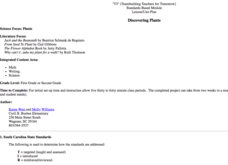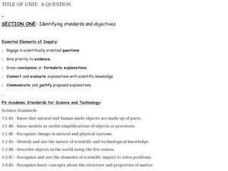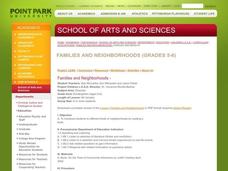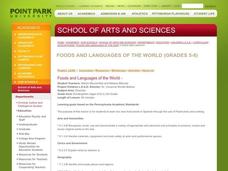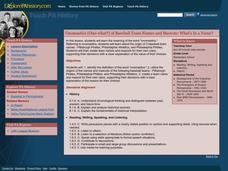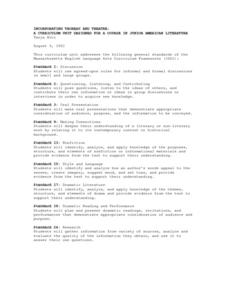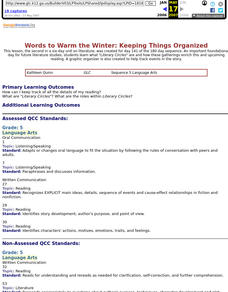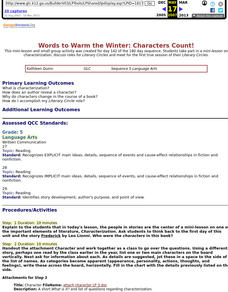Curated OER
Nursery Rhymes
Students recall details of nursery rhyme read by teacher, identify main characters, and demonstrate knowledge of poem by creating concept map about story that includes title, clip art, and changes in font and color.
Curated OER
The Stinky Cheese Man and Other Fairly Stupid Tales
Sixth graders demonstrate the ability to process and evaluate content from a variety of sources and apply comprehension skills to the material read. They organize information for practical use and design and develop an informational...
University of Southern California
Discovering Plants
Students construct a small greenhouse and plant lima beans. They read books about plants, tend the lima bean seedlings, observe and record plant growth, taste a variety of plants and maintain plant journals.
Curated OER
Scaffolding a Reading/Writing Lesson
Students explore pre-reading activities. Through looking at titles, and observing pictures, students predict what will happen in a story. They listen to a part of the story and then write their own conclusion. Students complete the story...
Curated OER
Geometry and Quilting
Fourth graders combine geometry and language arts skills while examining quilt-making. After identifying the geometric shapes contained in quilts, they write stories to encompass the quilt border. Students conclude by creating and...
Curated OER
A QUESTION
Young scholars engage in scientifically oriented questions. They give priority to evidence, draw conclusions/formulate explanations and connect/evaluate explanations with scientific knowledge. Students communicate and justify proposed...
Curated OER
Science Talk about Mammals and Reptiles/Amphibians
Third graders use the internet to research mammals, reptiles and amphibians. They list important items about their chosen animal. Students identify characteristics of an animal and where they live. They classify animals as a mammal,...
Curated OER
Literal Meaning of Reading
Students practice basic reading skills. In this reading lesson plan, students review the letter M, read the story If You Give a Mouse a Muffin. Students will then write a book using their name, for example: If You Give a Taco to Tracy.
Curated OER
Literal Meaning of Reading
Students demonstrate literal meaning of a fiction book. For this reading comprehension lesson, students listen to the book, If You Give a Mouse a Muffin and practice the "m" sound during the read aloud. Students answer questions about...
Curated OER
Families and Neighborhoods
Students answer questions about families and what they do together. Students discuss different types of families and draw a picture of their family, discussing similarities and differences in the pictures and in families in general.
Curated OER
Foods and Languages of the World
Young scholars review Mexico's location and language and learn to pronouns 10 new Spanish food words. Students listen as the book, Corn is Maize is read, touching and passing around an ear of Indian corn. Young scholars discuss the...
Curated OER
Baseball Cards
Students read a short story on baseball cards and reflect on Honus Wagner's decision to withdraw his card. In this baseball cards lesson plan, students study how children used cards in the 1930's and express their understanding of Honus...
Curated OER
What's In a Name?
Young scholars explore onomastics. In this baseball history activity, students create their own team name and explain the name they chose. After choosing a team name young scholars support their choice with revelant reasons and be able...
Curated OER
Greek mythology (characteristics and features)
Students recognize the features and characteristics of myths, the role myths played in Greek culture, and choose a writing project. For this Greek mythology lesson, students are introduced to Greek mythology and work in cooperative...
Curated OER
Apply Post-Reading Skills and Discuss Persuasive Text
Students put their reading comprehension skills to practice. In this interpreting text lesson, students read "Chief Red Jacket's Reply," and then respond to questions that require them to reason, infer, and analyze the selection.
Curated OER
Note-Taking
Learners take notes and summarize information. For this communication lesson, students summarize information by taking notes using the various methods that their instructor presents to them.
Curated OER
Leapin' Landmarks: Locating 10 Man-made Landmarks Around the World
Third graders label continents, oceans, and major mountain ranges on maps and use the maps to write an informational report about landmarks. In this landmarks lesson plan, 3rd graders write about 1 major landmark.
Curated OER
Alliteration
In this alliteration worksheet, 4th graders write alliterations with their first names, find rhyming patterns in poems, and more. Students complete 4 activities.
Curated OER
Health Education: Tobacco Products
Second graders analyze the dangers of using tobacco products. In this health lesson plan, 2nd graders learn about the dangers of tobacco products as they watch a teacher-led puppet show and sing a new song.
Curated OER
What Genre Am I?
First graders differentiate between different pieces of literary genres by participating in a hands-on activity. This includes a student assessment sheet.
Curated OER
Incorporating Thoreau And Theatre
Students investigate the writings of Thoreau. They read passages orally and look for words of imagery in the text. Students also answer a series of questions and they convert passages of writing into theatrical presentations in order to...
Curated OER
Words to Warm the Winter: Keeping Things Organized
Fifth graders are in Literary Circles according to the book they've chosen and choose roles.
Curated OER
Words to Warm the Winter: Characters Count!
Fifth graders take part in a mini-lesson on characterization, discuss roles for Literary Circles and meet for the first true session of their Literary Circles.
Curated OER
A View of Yourself Through Famous Writers
Students research famous quotes and discover one that describes themselves. They consider topics such as family and hobbies that will help others understand them. They present their information to the class.


